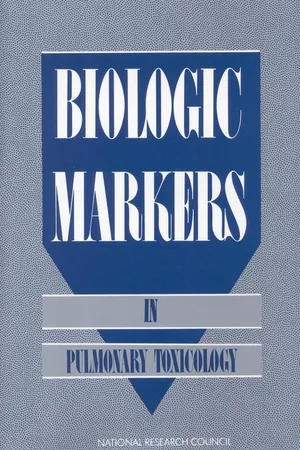About this book
Biologic markers--indicators of biological exposure or change--offer the promise of early detection of disease caused by environmental exposure. Researchers have used these markers to discover indications of pulmonary damage from low-level ozone, a finding with serious implications for health professionals and environmental regulators. Biologic Markers in Pulmonary Toxicology is a comprehensive study of this use of biologic markers. Focusing on the respiratory tract as an entryway for airborne pollutants, this volume reviews new ways of measuring markers, the need for markers to indicate dose or exposure levels, noninvasive respiratory function tests for use with healthy humans to detect sensitivity to inhaled pollutants, approaches to evaluating markers down to the cellular and biochemical levels, and more.
Frequently asked questions
- Essential is ideal for learners and professionals who enjoy exploring a wide range of subjects. Access the Essential Library with 800,000+ trusted titles and best-sellers across business, personal growth, and the humanities. Includes unlimited reading time and Standard Read Aloud voice.
- Complete: Perfect for advanced learners and researchers needing full, unrestricted access. Unlock 1.4M+ books across hundreds of subjects, including academic and specialized titles. The Complete Plan also includes advanced features like Premium Read Aloud and Research Assistant.
Please note we cannot support devices running on iOS 13 and Android 7 or earlier. Learn more about using the app.
Information
Table of contents
- Biologic Markers in Pulmonary Toxicology
- Copyright
- Preface
- Contents
- Executive Summary
- 1 Introduction
- 2 Markers of Exposure
- 3 Markers of Physiologic Effects in Intact Organisms
- 4 Markers of Altered Structure or Function
- 5 Markers of Inflammatory and Immune Response
- 6 Markers of Cellular and Biochemical Response
- 7 Conclusions and Recommendations
- References
- Biographies
- Index
